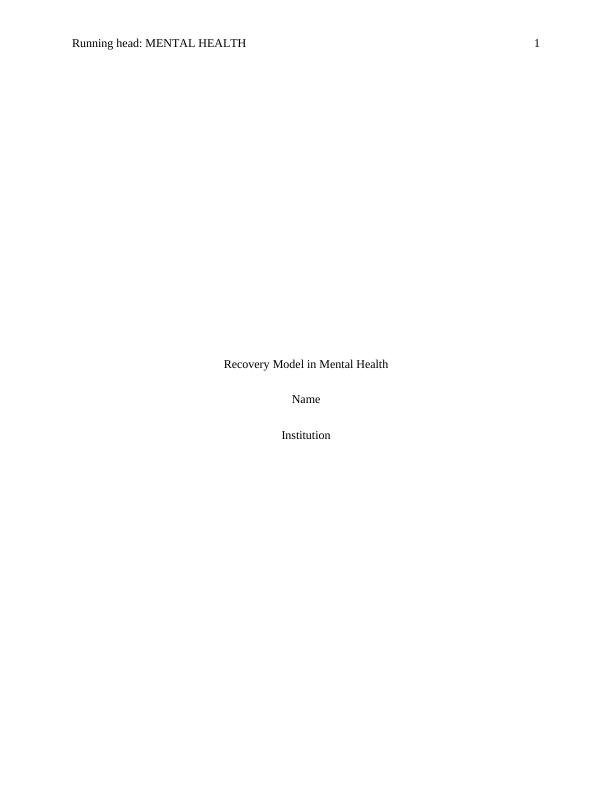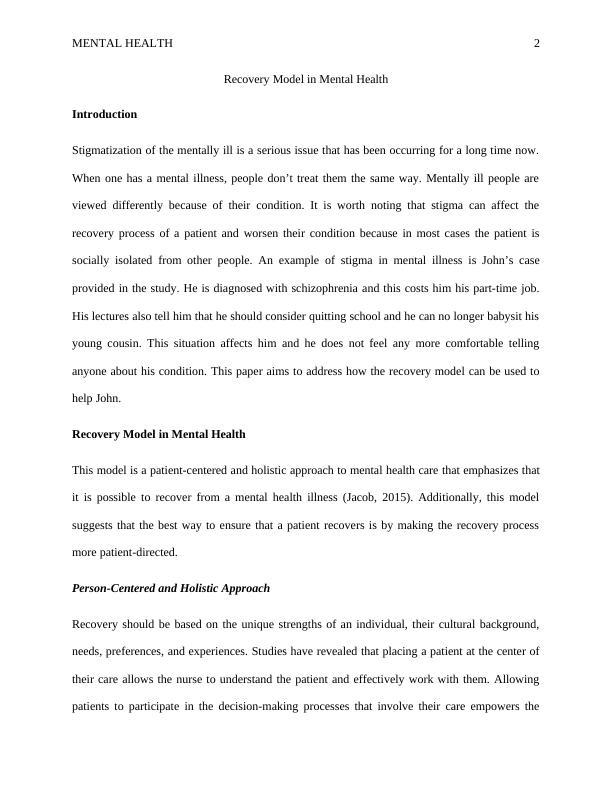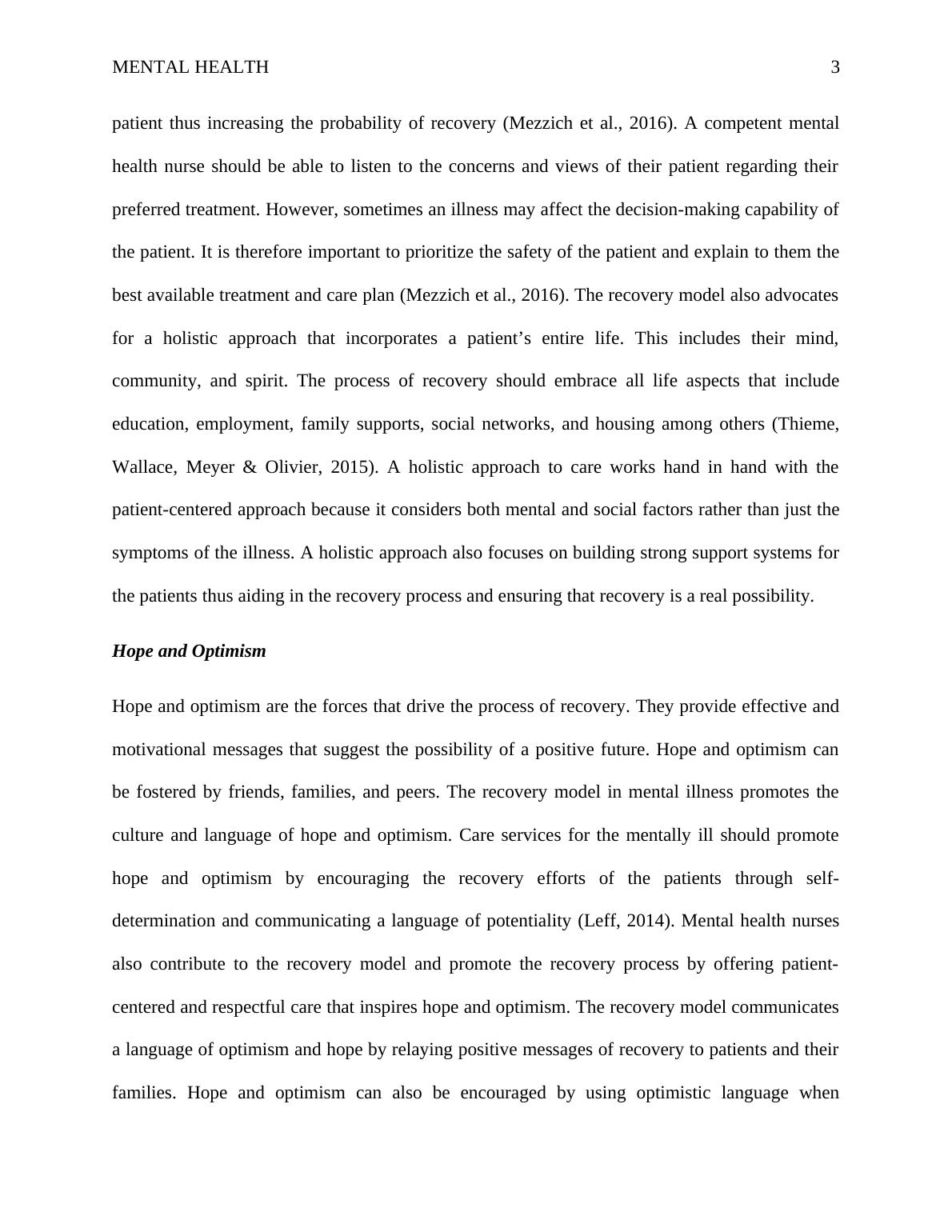Mental Illness And Health Assignment
8 Pages1870 Words15 Views
Added on 2022-09-13
Mental Illness And Health Assignment
Added on 2022-09-13
ShareRelated Documents
Running head: MENTAL HEALTH 1
Recovery Model in Mental Health
Name
Institution
Recovery Model in Mental Health
Name
Institution

MENTAL HEALTH 2
Recovery Model in Mental Health
Introduction
Stigmatization of the mentally ill is a serious issue that has been occurring for a long time now.
When one has a mental illness, people don’t treat them the same way. Mentally ill people are
viewed differently because of their condition. It is worth noting that stigma can affect the
recovery process of a patient and worsen their condition because in most cases the patient is
socially isolated from other people. An example of stigma in mental illness is John’s case
provided in the study. He is diagnosed with schizophrenia and this costs him his part-time job.
His lectures also tell him that he should consider quitting school and he can no longer babysit his
young cousin. This situation affects him and he does not feel any more comfortable telling
anyone about his condition. This paper aims to address how the recovery model can be used to
help John.
Recovery Model in Mental Health
This model is a patient-centered and holistic approach to mental health care that emphasizes that
it is possible to recover from a mental health illness (Jacob, 2015). Additionally, this model
suggests that the best way to ensure that a patient recovers is by making the recovery process
more patient-directed.
Person-Centered and Holistic Approach
Recovery should be based on the unique strengths of an individual, their cultural background,
needs, preferences, and experiences. Studies have revealed that placing a patient at the center of
their care allows the nurse to understand the patient and effectively work with them. Allowing
patients to participate in the decision-making processes that involve their care empowers the
Recovery Model in Mental Health
Introduction
Stigmatization of the mentally ill is a serious issue that has been occurring for a long time now.
When one has a mental illness, people don’t treat them the same way. Mentally ill people are
viewed differently because of their condition. It is worth noting that stigma can affect the
recovery process of a patient and worsen their condition because in most cases the patient is
socially isolated from other people. An example of stigma in mental illness is John’s case
provided in the study. He is diagnosed with schizophrenia and this costs him his part-time job.
His lectures also tell him that he should consider quitting school and he can no longer babysit his
young cousin. This situation affects him and he does not feel any more comfortable telling
anyone about his condition. This paper aims to address how the recovery model can be used to
help John.
Recovery Model in Mental Health
This model is a patient-centered and holistic approach to mental health care that emphasizes that
it is possible to recover from a mental health illness (Jacob, 2015). Additionally, this model
suggests that the best way to ensure that a patient recovers is by making the recovery process
more patient-directed.
Person-Centered and Holistic Approach
Recovery should be based on the unique strengths of an individual, their cultural background,
needs, preferences, and experiences. Studies have revealed that placing a patient at the center of
their care allows the nurse to understand the patient and effectively work with them. Allowing
patients to participate in the decision-making processes that involve their care empowers the

MENTAL HEALTH 3
patient thus increasing the probability of recovery (Mezzich et al., 2016). A competent mental
health nurse should be able to listen to the concerns and views of their patient regarding their
preferred treatment. However, sometimes an illness may affect the decision-making capability of
the patient. It is therefore important to prioritize the safety of the patient and explain to them the
best available treatment and care plan (Mezzich et al., 2016). The recovery model also advocates
for a holistic approach that incorporates a patient’s entire life. This includes their mind,
community, and spirit. The process of recovery should embrace all life aspects that include
education, employment, family supports, social networks, and housing among others (Thieme,
Wallace, Meyer & Olivier, 2015). A holistic approach to care works hand in hand with the
patient-centered approach because it considers both mental and social factors rather than just the
symptoms of the illness. A holistic approach also focuses on building strong support systems for
the patients thus aiding in the recovery process and ensuring that recovery is a real possibility.
Hope and Optimism
Hope and optimism are the forces that drive the process of recovery. They provide effective and
motivational messages that suggest the possibility of a positive future. Hope and optimism can
be fostered by friends, families, and peers. The recovery model in mental illness promotes the
culture and language of hope and optimism. Care services for the mentally ill should promote
hope and optimism by encouraging the recovery efforts of the patients through self-
determination and communicating a language of potentiality (Leff, 2014). Mental health nurses
also contribute to the recovery model and promote the recovery process by offering patient-
centered and respectful care that inspires hope and optimism. The recovery model communicates
a language of optimism and hope by relaying positive messages of recovery to patients and their
families. Hope and optimism can also be encouraged by using optimistic language when
patient thus increasing the probability of recovery (Mezzich et al., 2016). A competent mental
health nurse should be able to listen to the concerns and views of their patient regarding their
preferred treatment. However, sometimes an illness may affect the decision-making capability of
the patient. It is therefore important to prioritize the safety of the patient and explain to them the
best available treatment and care plan (Mezzich et al., 2016). The recovery model also advocates
for a holistic approach that incorporates a patient’s entire life. This includes their mind,
community, and spirit. The process of recovery should embrace all life aspects that include
education, employment, family supports, social networks, and housing among others (Thieme,
Wallace, Meyer & Olivier, 2015). A holistic approach to care works hand in hand with the
patient-centered approach because it considers both mental and social factors rather than just the
symptoms of the illness. A holistic approach also focuses on building strong support systems for
the patients thus aiding in the recovery process and ensuring that recovery is a real possibility.
Hope and Optimism
Hope and optimism are the forces that drive the process of recovery. They provide effective and
motivational messages that suggest the possibility of a positive future. Hope and optimism can
be fostered by friends, families, and peers. The recovery model in mental illness promotes the
culture and language of hope and optimism. Care services for the mentally ill should promote
hope and optimism by encouraging the recovery efforts of the patients through self-
determination and communicating a language of potentiality (Leff, 2014). Mental health nurses
also contribute to the recovery model and promote the recovery process by offering patient-
centered and respectful care that inspires hope and optimism. The recovery model communicates
a language of optimism and hope by relaying positive messages of recovery to patients and their
families. Hope and optimism can also be encouraged by using optimistic language when

End of preview
Want to access all the pages? Upload your documents or become a member.
Related Documents
The Mental Health Nursinglg...
|9
|2291
|24
(PDF) Recovery-focused practice in mental healthlg...
|9
|1575
|46
Jeremy Oxley’s Documentary Report on Mental Health | Schizophrenialg...
|8
|1910
|305
Social Dimensions of Mental Recoverylg...
|22
|7107
|471
Recovery Oriented Practice in Mental Health Treatmentlg...
|6
|1645
|321
Mental health in the communitylg...
|5
|1172
|51
